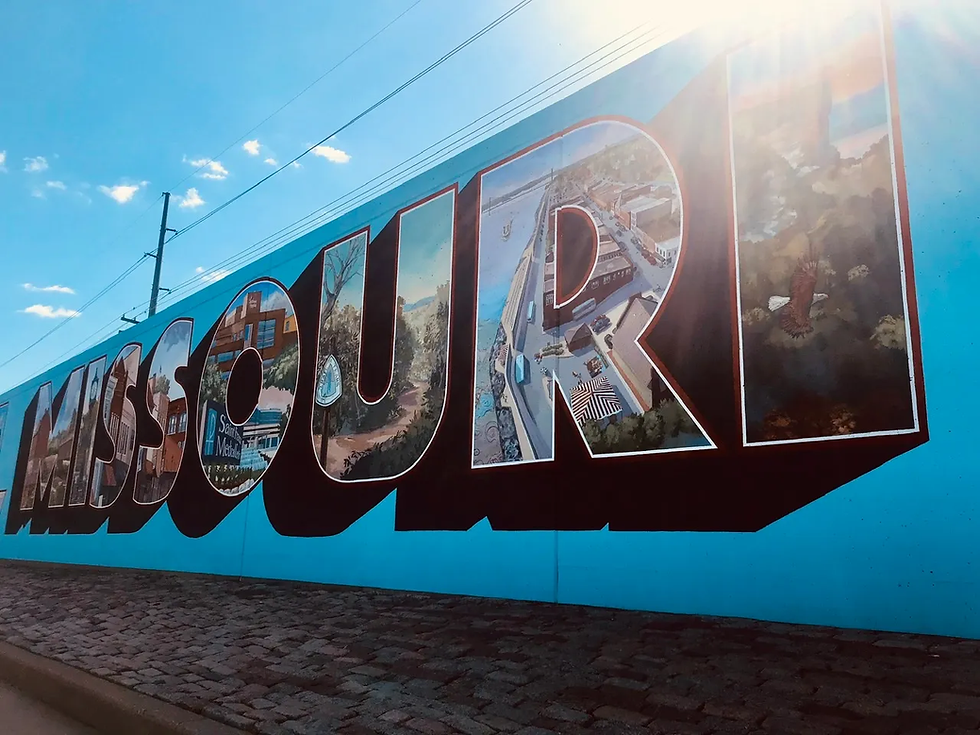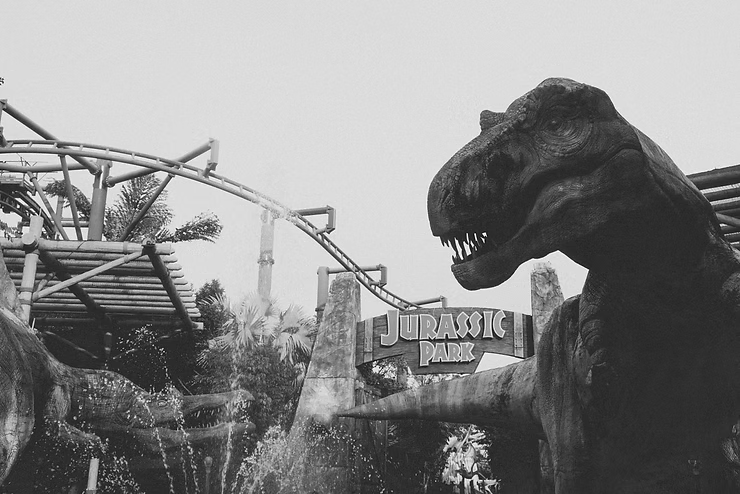Obsessing Over Missouri’s Biregional Identity
- Liz

- Aug 4, 2025
- 5 min read
Updated: Sep 6, 2025

I have long said the South and the Lower Midwest are cousins. My hometown is the official gateway to the Ozarks, where every bank and business switches between the labels: “Southern,” “Midwest,” and “Ozark.” I was born and raised in southeast Missouri, near the Missouri Bootheel, and my upbringing was heavily influenced by my grandparents, who were themselves Bootheel natives. My grandmother spoke with the kind of Southern accent you might hear in an old movie. My grandfather was the son of a cotton sharecropper.
Before my ancestors were Missourians, they were Tennesseeans, Arkansans, and Kentuckians. My childhood memories heavily feature cypress-tupelo swamps, crepe myrtles, azaleas, hydrangeas, mimosa trees, honeysuckle, and magnolia trees. As a little girl, I pronounced “motel” like “mo-tay-elle.” Hell, I took the New York Times U.S. dialect quiz last year and it pegged me as an Alabaman. “Bless your heart,” “y’all,” “you all,” and “all y’all,” are commonly spoken in my corner of the Show Me State. Southeast Missourians say “yes ma’am” and “no sir,” even when we’re dealing with people our own age. We drink sweet tea and eat banana pudding and homemade biscuits with chocolate gravy. We host fish frys, bonfires, and crawfish boils. My hometown is closer to Jackson, Mississippi than Chicago, Illinois; New Orleans, Louisiana than Detroit, Michigan; Memphis, Tennessee than Branson, Missouri. We see armadillos daily. We read Southern Living.
I’ve written about it before: historically, culturally, and geographically, southeast Missouri is as Southern as it is Midwestern, and I’m not the only one who knows this. I’ve done the research; I’ve talked to Missourians, North Carolinians, Arkansans, and others interested in the topic, and the consensus is always the same: southeast Missouri feels Southern, sounds Southern, is Southern. In my mind, Missouri’s biregional identity is well established and undeniable. What I've only recently started to understand is why it’s so important to me, why I’m not always comfortable identifying as Southern around other Southerners, and why I still feel a bit heartbroken when someone suggests southeast Missouri isn’t really the South.
I started obsessing over Missouri’s biregional identity — and digging deeper into my own Southern ancestry — around the same time I left the church and started coming to terms with my bisexuality. I wasn't conscious of it at the time, but looking back, I realize it’s no coincidence I began clinging to Southern identity in my late teens, around the same time I was losing my religion and accepting my queerness.
As someone hailing from and living in the rural Bible Belt, I needed at least one facet of my identity to be palatable to my community. As someone with conservative Christian parents, I needed to replace one bond with another. As a young bisexual woman, I faced as much bisexual erasure and gaslighting from the queer community as I did from the mainstream heterosexual community. I felt as uncomfortable coming out to gays and lesbians back then as I did coming out to straight folks, and I could no longer identify as anything more than a cultural Christian — but I could happily and openly embrace my Southerness.
I started leaning into Southern Belle style: I grew my hair long and blonde. I got really tan. I wore little white sundresses and cowgirl boots and invested in a good waterproof mascara. I bought a Southern Living cookbook and attended Memphis in May. I saw Miranda Lambert in concert and bought my first Lynyrd Skynyrd album. I drove a small pickup truck and developed a talent for shooting cola cans. I stopped worrying about sounding like a hillbilly, letting myself say, “y’all,” “I reckon,” and “fixin’ to,” proudly and often after years of policing my speech. It all felt fun and natural, and my Southerness was well-received.
I’m in my thirties now, and I don’t need to wear little white sundresses and shoot guns to feel Southern anymore. I busted out of the closet — loudly and frequently — in my mid-twenties. I’ve accepted that a large portion of my kin and my regional community believe I’m hellbound, and it doesn’t bother me that much anymore. I’ve accepted that there will always be queer people who can’t wrap their heads around bisexuality, who can’t embrace bisexuals as part of their community, and that doesn’t bother me too much anymore either.
But I can’t seem to accept the fact that some folks refuse to see Missouri — especially southeast Missouri — as both the South and the Midwest. I feel a little ridiculous admitting it, but it actually hurts my feelings. It’s a fact that sometimes keeps me from categorizing myself as Southern in the presence of other Southerners. In 2021, during a nighttime ghost tour of downtown Nashville, the tour guide asked: “How many of you are from the South?” and my fear of invalidation triumphed over my desire to raise my hand.
The way I embody and celebrate them may change over time, but my queer, spiritual, ancestral, and regional identities become more precious to me, and more intertwined, the older I get. I often refer to myself as a “Bible Belt Queer,” a label I thank creator Darci McFarland for, and I can’t seem to stop writing about regional identity, family identity, spiritual identity, queer identity, and how they all connect. In fact, I wrote an entire chapbook that — among other things — deals with these identities individually as well as where they intersect.
A while ago, a North Carolinian friend of mine surprised me when they said people sometimes tell them North Carolina isn’t “really the South.” This was shortly after they told me my hometown of Poplar Bluff, Missouri “feels Southern.” We kept talking about regional identity; I defended Florida’s claim to Southerness, saying something like: “northern Florida is Southern as hell.” I said whether people ask if I’m from the Midwest or the South, I say yes. I said: “if Kentucky is the South, we’re the South.” After a while, I heard myself say: “There’s few things more Southern than arguing about who’s more Southern” — a statement immediately followed by “that’s true” and shared laughter. It felt like community.
I don’t know if or when I’ll let go of the need to be embraced by the South as a Missourian, because I still get so excited when Southern Living features Missouri in its “Best of the South” and travel articles, and conversations like the one detailed above leave me feeling so validated and joyful. I do know I’m proud of where I come from, and I’m proud of who I’ve become. However the South defines it, I love southeast Missouri, and I’m not going anywhere.


